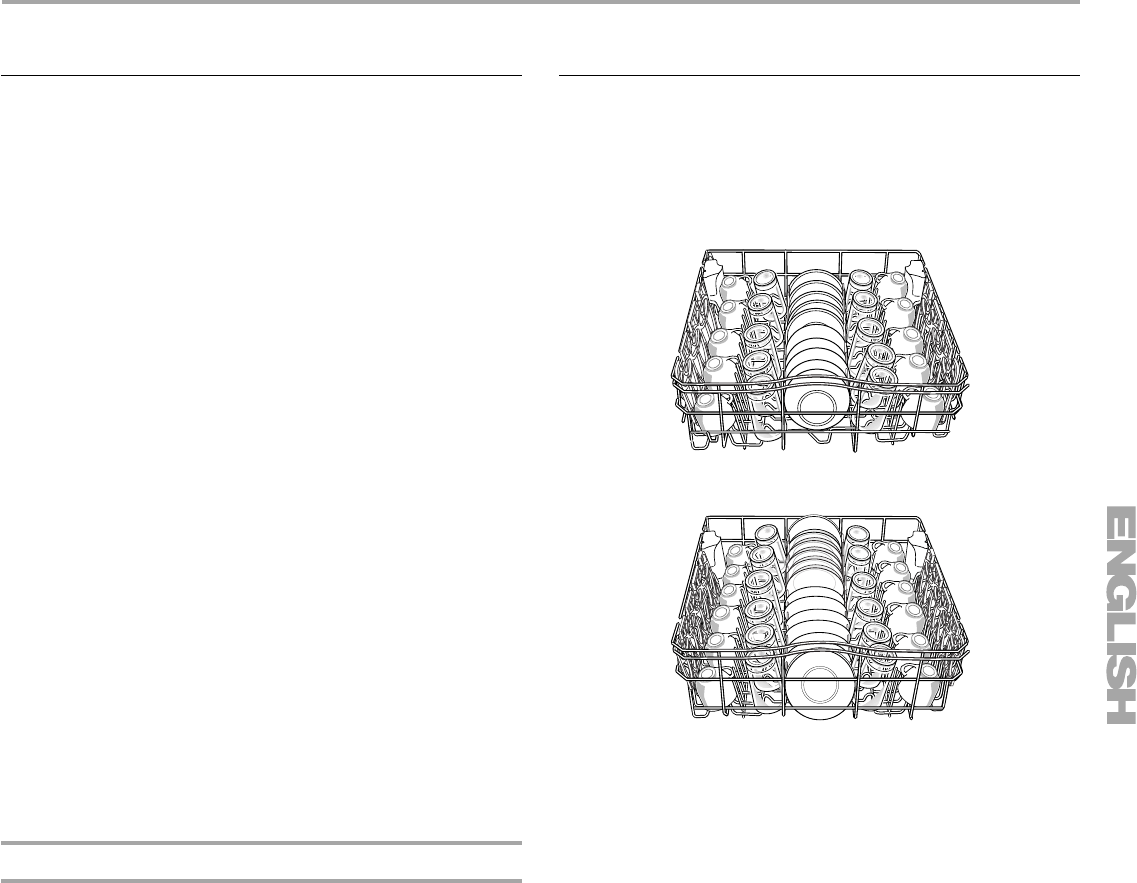
9
DISHWASHER LOADING
Loading Suggestions
■ Remove leftover food, bones, toothpicks and other hard
items from the dishes. To conserve water and energy and
save time, it is not necessary to rinse dishes before putting
them into the dishwasher.
NOTE: Prerinsing dishes soiled with tomato-based products
is recommended to avoid staining the dishware.
The wash module removes food particles from the water. The
module contains a triple action filtration system that
intermittently filters soil from the water.
NOTE: If hard items such as fruit seeds, nuts, and eggshells
enter the wash module, you might hear grinding, crunching,
or buzzing sounds. These sounds are normal when hard
items enter the module. Do not let metallic items (such as pot
handle screws) get into the wash module. Damage can occur.
■ For best drying, water must be able to drain from all surfaces.
■ It is important for the water spray to reach all soiled surfaces.
■ Load dishes so they are not stacked or overlapping if
possible.
■ Use special care when loading heavy pots and pans. Heavy
items can damage the interior of the door if they are dropped
or bumped.
■ Make sure pot lids and handles, pizza pans, cookie sheets,
etc., do not interfere with the spray arm rotation.
■ Conserve water and energy and save time over hand rinsing
by running a rinse cycle to keep dishes moist if you do not
plan to wash them soon. Foods such as eggs, rice, pasta,
spinach, and cooked cereals may be hard to remove if they
are left to dry over a period of time.
■ Place items so open ends face down for best cleaning and
draining.
Quiet operating tips
To avoid thumping/clattering noises during operation:
■ Make sure lightweight load items are secured in the racks.
■ Make sure pot lids and handles, pizza pans, cookie sheets,
etc., do not touch interior walls or interfere with the rotation of
the spray arm(s).
■ Load dishes so they do not touch one another.
NOTE: For built-in models, keep sink drain plugs closed during
dishwasher operation to avoid noise transfer through drains.
Loading Top Rack
The top rack is designed for cups, glasses, and smaller items.
Many items, up to 11" (28 cm), fit in the top rack. (See
recommended loading patterns shown.)
NOTE: The features on your dishwasher rack may vary from the
drawings shown.
■ Place items so open ends face down for cleaning and
draining.
■ Load glasses in top rack only. The bottom rack is not
designed for glasses. Damage can occur.
■ Place cups and glasses in the rows between tines. Placing
them over the tines can lead to breakage and water spots.
■ China, crystal, and other delicate items must not touch each
other during dishwasher operation. Damage may occur.
■ Load lightweight plastic items in the top rack only. Only
plastic items marked “dishwasher safe” are recommended.
■ Load plastic items so the force of the spray does not move
them during the cycle.
■ To avoid chipping, do not let stemware touch other items.
■ Small bowls, pans, and other utensils can be placed in the
top rack. Load bowls in the center section for best stability.
10 place setting
12 place setting
